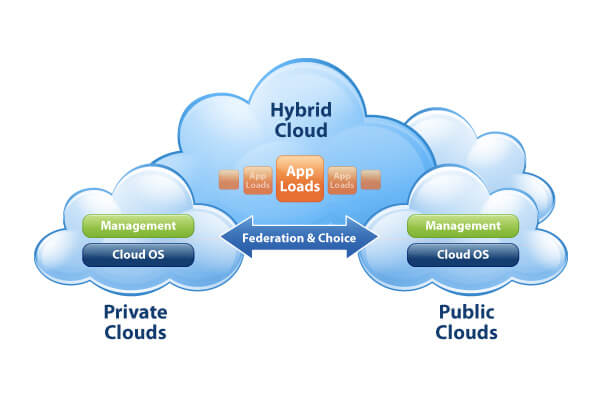There are public, private and hybrid clouds. So what are the advantages of each type of cloud and how to decide what is the optimum for the company? These are usually some points every business must have clear cut answers for selecting the more suitable cloud computing model.
Moving to the cloud or not is no longer an uncertainty, the more bothering debate now in the market is choosing the most suitable cloud computing model for a particular organization.
In its annual survey of executives in the technology industry, “2013 Technology Industry Business Outlook” , KPMG concluded that cloud computing will be one of the biggest drivers of revenue for companies in the next three years. Also, most of the companies surveyed already had or are in the process of adopting such technology, while only 15% do not have or do not plan to use it in the short or medium term.
Cloud computing has different options. There the public, private and hybrid clouds . So what are the advantages of each type of cloud and how to decide what is the optimum for each company? Besides the size of an organization, there are other factors that determine a wise decision. Among the most important is the level of security and control required and the type of industry you belong to.
Here’s How To Pick The More Suitable Cloud Computing Model For Your Business:
These are some of the characteristics of each scheme, according to FJ Gould, Executive Director of Operations and Director of Channels VMware Latin America.
Public Cloud :
The public cloud is a set of services, applications, computer networks and infrastructure provided by a supplier on the Internet. Its popularity is because the configuration is quick and easy, since the hardware, applications and bandwidth are provided by the same vendor. Many companies offer these clouds with the business model of pay per use.
Its main advantage is the economy of scale, since the costs are shared among all users, similar to the electricity company in which each customer pays for what he consumes. Another important advantage is the ability to increase computing capacity according to particular needs and that the process is transparent to the user.
The public cloud is the suitable cloud computing model for a company if:
- The applications are used by many people from different types of devices. For example, email.
- Requires additional computing capacity to cover demand in times of increased use.
- Need an environment where one can develop and evaluate applications quickly.
- Collaborate on projects with other companies.
Private Cloud :
As its name suggests, the private cloud replicates the functionality of the public, but is for the exclusive use of a single organization. This cloud allows you to store business cloud applications while offering a high level of control and security, but requires greater capital investment. “Private clouds can be managed and physically located within the organization or can be administered by a third party.
You should opt for the Private Cloud if:
- Control and security of your applications and data are critical.
- The business is engaged in an industry with strict safety laws and data privacy, for example, health care.
- Want more control, performance and at the same time enjoy the benefits of the cloud.
- The company has the resources to manage a private cloud efficiently.
Hybrid Cloud :
Finally, hybrid clouds combine two or more clouds (public and private) from multiple vendors that although remain as separate entities, join to take advantage of each scheme. For example, in a hybrid cloud one can use public cloud resources to increase processing capacity of your private cloud peaking of bandwidth consumption without the capital investment that would entail. The biggest challenge of these clouds is to unify safety and ensure that all providers can communicate with each other.
Hybrid Cloud is the most suitable cloud computing model if your company:
- Uses the public cloud for customers external information technology and privacy for inmates.
- Provides services to different markets. You can use a public cloud to interact with users while maintaining their protected data in their private cloud data.
- Needs to increase the capacity of a private cloud but do not want to invest or do not have the capital for infrastructure.
- Intends to use a SaaS application (Software-as-a-Service) , as a service to a company in the public cloud, but are concerned about security. The application vendor can create a private cloud exclusively for the company inside your firewall.
Like we always mention, cloud computing is easier than it seems and understanding both the similarities and differences between the three models will surely help you choose between one of them.
“It is critical that a detailed analysis of the current infrastructure of information technology analysis is performed, how it is used and, above all, their present and future requirements,” recalls Gould, “in this way, you can select the type Cloud that optimally meet your needs and give you the infrastructure and support to achieve the objectives of the organization.
